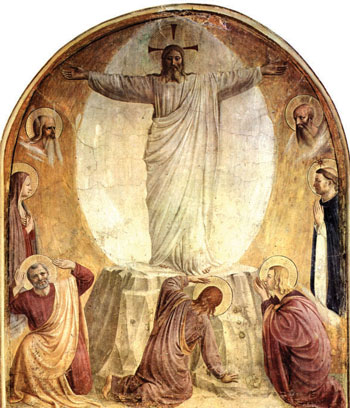1. Opening Hymn – “Songs of thankfulness and praise”
2. Hymn of Praise – “All creatures of our God and King”
3. Readings
St. Peter's Episcopal Church, Port Royal, VA

We are a small Episcopal Church on the banks of the Rappahannock in Port Royal, Virginia. We acknowledge that we gather on the traditional land of the first people of Port Royal, the Nandtaughtacund, and we respect and honor with gratitude the land itself, the legacy of the ancestors, and the life of the Rappahannock Tribe. Our mission statement is to do God’s Will in all that we do.
1. Opening Hymn – “Songs of thankfulness and praise”
2. Hymn of Praise – “All creatures of our God and King”
3. Readings
Two special events
This was the last Sunday in Epiphany before Lent begins Wed., Feb 14. For the children (ages 5-9), it was hiding the Alleluia banner. Sunday included finishing the box in the Parish House (see the image), transporting it to the Church, and talking about Lent this week. Last week the banner was hung on the altar. During the last hymn in the service, appropriately, “Alleluia, alleluia give thanks”, it was placed in the box the children made.
For the rest of us, Sunday included donating food for the “Souper Bowl” and hearing a sermon on the Transfiguration. In 1990, a simple prayer: “Lord, even as we enjoy the Super Bowl football game, help us be mindful of those who are without a bowl of soup to eat” was delivered to a small youth group at Spring Valley Presbyterian Church in Columbia, SC led by Brad Smith, who was serving as a seminary intern at the time. It led to a movement to help those who are food insecure on this day. We made our goal of thirty cans of soup and thirty cards for those who come to the distribution on Wed. Feb 21, 3pm-5pm.

We are at a transition. Last Sunday, Feb. 4, God’s Garden children completed a banner and hung it on the altar. It is a transition from Epiphany to Lent with a banner first and then a change in the colors on the altar.
So to the trip to the mountain on Feb. 11, the Transfiguration is one too with the individuals involved in the world but at the same time separated. That’s the way it is sometimes going through changes.
Here is a piece that marks the transition- “Transfiguration, Beauty and Biblical Interpretation” by Zoltán Dörnyei
“We come to the Transfiguration at a critical point within salvation history: just a week earlier Peter had declared on behalf of the disciples that Jesus was ―the Messiah, the Son of the living God‖ (Matt 16:16), and from that point onwards Jesus started to talk about his orthcoming suffering, death and resurrection. His teaching also included the warning that if anybody wanted to follow him, they had to ―deny themselves and take up their cross‖ (Matt 16:24) as well as a declaration about his second coming ―in the glory of his Father‖ (Matt 16:27). The preparation stage was now over and the final, climactic phase of Jesus‘ earthly life – involving the last journey to Jerusalem and the Passion – was about to begin. The Transfiguration therefore marks a watershed in Jesus‘ ministry; in Michael Ramsey‘s words, it represents a ―height from which the reader looks down on one side upon the Galilean ministry and on the other side upon the Via Crucis.”
The Sermon from Tom Hughes spoke of a transition and where we should be going. “The whole idea is that in Christ we’re always becoming called to things as they were not before becoming a new person. ” On the Transfiguration, ““…He was transfigured. He became fully the person he was created to be.” Unlike Jesus we are not there.
Moving forward, Forward Movement for Feb. 14 includes this phrase – “Ash Wednesday is my favorite holy day because I am reminded that in the nothingness of dust, in God’s value of the inverse of our earthly values. I am filled with the wonder of creation and the reality of the unfailing and unconditional love of God. ” We are still finding that wonder, filling in the spaces, investigating the possibilities and becoming the people we are meant to be. There’s energy in that!
One of the possibilities is continuing our work supporting the larger community. The congregations responded on Sunday for our two outreach projects- 1. The SouperBowl 2. Supporting the Discretionary fund.
The SouperBowl collected 41 cans of food and 33 cards donated plus $75 in monetary donations. This is above last year’s 25 cans. The Disctionary Fund. A total of $270 was collected Feb 11, 2024. “In January, $850 of our discretionary fund helped 9 families with internet access, rent, and electricity.”
Another possibility is continuing to develop our youngest children in God’s Garden. Last week we spotlighted the creation of the Alleluia Banner. This week they added art work to a box and during the last hymn, took the Banner, placed it in the box and hid it away for Lent. They see this transition in life to the beauty that will eventually blossom at Easter.
There is a lot yet to be done

Bring a can, or cans, of soup to church on the 11th, along with a Valentine’s Day card wishing the recipient love from St Peter’s to be included in a Village Harvest bag on Wed, February 21st. The goal—thirty cans of soup and thirty cards for those who come to the distribution. Monetary donations to the Village Harvest are always welcome. Write a check to St Peter’s with Village Harvest in the memo line if you wish to donate.
1. Transfiguration is transformation. No one and no situation is "untransfigurable" – Dawn Hutchings

In his book, God Has A Dream: A Vision of Home for Our Time, Desmond Tutu tells about a transfiguration experience that he will never forget. It occurred when apartheid was still in full swing. Tutu and other church leaders were preparing for a meeting with the prime minister of South Africa to discuss the troubles that were destroying their nation. They met at a theological college that had closed down because of the white government’s racist policies. During a break from the proceedings, Tutu walked into the college’s garden for some quiet time. In the midst of the garden was a huge wooden cross. As Tutu looked at the barren cross, he realized that it was winter, a time when the grass was pale and dry, a time when almost no one could imagine that in a few short weeks it would be lush, green, and beautiful again. In a few short weeks, the grass and all the surrounding world would be transfigured.
As the archbishop sat there and pondered that, he obtained a new insight into the power of transfiguration, of God’s ability to transform our world. Tutu concluded that transfiguration means that no one and no situation is “untransfigurable.” The time will eventually come when the whole world will be released from its current bondage and brought to share in the glorious liberty that God intends.
The Role of Food Insecurity
| Year | % Food Insecurity |
|---|---|
| 2017 | 10.2 |
| 2018 | 9.9 |
| 2019 | 9.4 |
| 2020 | 7.7 |
| 2021 | 8.1 |
The Souper Bowl helps to fund the Village Harvest which is not budgeted but depends on contributions. Harvest fund levels are affected by trends in food insecurity.
The trends of food insecurity have improved over the last few year as a percentage of the population except for the last year (2021) in the table.
That’s the good news we can all appreciate. However, all groups in the community have not shared in this improvement.
Food insecurity is an economic condition driven by several factors, chief among these is a lack of money. Overall, the economy has been positive in these years accounting for downward trend percentage of food insecurity. There is an underlying second issue. Food insecurity is affected by underlying economic and social disadvantages reflecting racial differences.
Mt. Tabor, one in Israel, one possibility for the Transfiguration story.

“Think of this passage itself as a “high mountain” at the center of Mark’s Gospel. On one side, we climb up through stories of Jesus’ healing, liberating ministry. And on the other side, we’ll descend to the cross. Today, we arrive at a clearing on the mountaintop — and from here we can survey both how far we’ve come and the Lenten journey ahead.
“Epiphany concludes today: Jesus has “shown forth” to be a healer and a liberator; a teacher and a shining prophet. The “unclean spirit” has called him “the Holy One of God;” Peter has called him “the Messiah” (Mark 8:29). But most fundamentally and decisively, he is God’s beloved child. His path of love will lead down into the valley, through the dry cinders of Ash Wednesday and the tears of the Via Dolorosa, the Way of Sorrow, all the way to Easter Sunday and the Way of Life.
“Mark’s central point in the Transfiguration story is this: the suffering and death of Jesus may at first appear as an unthinkable, desecrating defeat, but it’s actually a step toward a dramatic, subversive victory. Jesus will now venture into the shadows of death — precisely in order to scatter those shadows once and for all, overcoming them in the end with shimmering light. ”
February involves the transition betweeen Epiphany and Lent and on that of Lent
Epiphany is about 2 revelations – Christ to the world through the wise men as well as revelation of Christ to us through baptism. On the first Sunday after the Epiphany, we celebrate the Feast of the Baptism of our Lord. His baptism is seen as the primary baptism, the one on which all baptisms follow, the recognition that his followers belong to God as “Christ’s own forever.”
During the three to eight weeks after the Epiphany, we learn in the gospel lectionary readings about Jesus’ miracles of healing and his teachings. This is a continuation of the theme of the revelation of Christ to his followers. “Come Follow Me”. Jesus has not only arrived but through him the kingdom of God as one who fulfills and extends God’s teachings through the Sermon of the Mount. The last Sunday in Epiphany, the transfiguration can be seen as the bridge between Epiphany and Lent.
At the beginning of the Epiphany season, at the Baptism of Jesus, the liturgical color was white. In the Gospel reading in Matthew at his baptism said, “And a voice from heaven said, “This is my Son, the Beloved, with whom I am well pleased.” In the Transfiguration which we will celebrate on Feb. 26, the 8th Sunday after Epiphany, the Gospel of Matthew records, “This is my Son, the Beloved; with him I am well pleased; listen to him!” The liturgical color once again is white.
Transfiguration serves as the culmination, the climax, of Jesus manifesting his glory and his identity as the Son of God. From this point on, Jesus sets out to Jerusalem, to suffer, die and be resurrected. We will see this story during Lent beginning March 1. This same glory he will return to, once he has completed the saving mission for which he came. Coming full circle, we will one day be in life with Christ as “Christ’s own forever.”
Click here to view in a new window.

The next eight Sundays of God’s Garden will include a big project!
During the first few sessions, the class will be designing and decorating a big banner with the word “Alleluia.” The banner will then be displayed in the church until the first Sunday of Lent when it will disappear.
The disappearance of the banner will be a reminder that during Lent the congregation does not end each service with the word “Alleluia,” and this will be a way to introduce lessons about Lent, Palm Sunday, and Easter. And, of course, the banner will re-appear on Easter!
I.Theme – God’s Transformative presence

"Transfiguration" – Fra Angelico
The lectionary readings are here or individually:
Old Testament – 2 Kings 2:1-12
Psalm – Psalm 50:1-6 Page 654, BCP
Epistle –2 Corinthians 4:3-6
Gospel – Mark 9:2-9
Old Testament – Elisha receives the mantle of prophetic responsibility from Elijah
Psalm – focuses on the meaning of sacrifice
Paul – Pictures the changes brought by the light of Christ
Mark – Peter, James and John are transformed at Jesus transfiguration
Commentary by Rev. Mindi Welton-Mitchell:
"Transfiguration Sunday marks the movement from Christ’s entry into the world (Advent/Christmas/Epiphany) into Christ’s Resurrection (Lent/Easter/Pentecost).
"We begin by reading the ascension into heaven by Elijah (in the Old Testament reading), preparing us for the vision of Elijah we will read in the Gospel. The ascension of Elijah marks one of those Mystery times in the Bible, when heaven and earth fully meet, where the Divine and Human intersect. People do not die but instead ascend into heaven. People’s faces are transformed. What has died is brought to new life.
"While this passage may be about Elijah’s ascension into heaven, it really is about Elisha’s faithfulness to both God and to his friendship with Elijah. Elisha is willing to go the distance for his friend, even to the point of being grieved as Elijah is taken up in the whirlwind. Elisha probably did not fully understand what was going to happen to Elijah, but he chose to accompany him rather than let him go the journey alone until the time he was taken up.
"Psalm 50:1-6 also speaks of the intersection of heaven and earth through God. The fire and tempest or whirlwind that Elijah experienced is present here before God in verse 3, and in the following verse, God calls to both the heavens and earth. These moments of intersection, where the Mystery happens, where the Divine and Creation intersect are not just for prophets, but can happen to those who are faithful.
"Mark 9:2-9 is the story of the Transfiguration. Peter, James and John experience this moment of intersection as they witness Jesus with Elijah and Moses. Jesus’s clothes become dazzling white, transfigured as Jesus appears to enter the veil between heaven and earth and stand between the two. But Peter does not get it. Peter does not listen and keep silent, as Elisha did. Peter, terrified of this space where heaven and earth meet, tries to fill the silence, tries to say something but does not understand what is happening. Perhaps Peter, as some scholars speculate, assumed Elijah and Moses were also divine beings or equals with Jesus and made his declaration of building tents. Perhaps Peter was ready for the restoration of the earthly kingdom of Israel and took this as a sign. We don’t really know.
"The Transfiguration is one of those passages that we don’t clearly understand what happened nor do we understand why Peter reacted the way he did. But what we do know is this: heaven and earth, Divine and Human, intersected on that mountain, just as they intersected in the person of Jesus the Christ.
"2 Corinthians 4:3-6 reminds us that the call to proclaim the Gospel is always at hand, and it is our call to proclaim it for the sake of Jesus, not for our own gain. There are some that will not receive and will not understand. We are called to bear the light of Christ to the world.
"There are moments when heaven and earth, Divine and Human, Creator and Creation intersect in our lives. They may not be as earth-shattering as the whirlwind and fire that Elisha saw Elijah taken up in, or as incredibly brilliant as Jesus speaking with Elijah and Moses. But they do happen to us: in our moments of baptism, when we fall and rise out of the waters anew; when we let go of loved ones as they pass on to God’s sole care; and in moments such as watching a brilliant sunrise or experiencing the Northern Lights: there are moments in creation and in our relationships with others where we experience the veil being torn and heaven and earth intersecting. Elisha experienced this in his faithfulness to Elijah; Peter experienced it on the mountain with Jesus and Moses experienced it on the mountain alone with God. But we all have our own experiences of the great Mystery, when we realize that the kingdom of heaven is very near. And as we remember, both John the Baptist and Jesus the Christ preached the same sermon that we often hear as we enter Lent: ‘The kingdom of heaven has drawn near; repent, and believe in the Good News.’"

Raphael (1483-1520) was a master painter of the Renaissance. Raphael considered the Transfiguration to be his greatest masterpiece though he died before he could finish it at age 37. A student finished it.
In his final delirium he asked to see his painting for the last time. His friends brought it to him, and placed it on the bed in which he died on Good Friday, 1520.
Giorgio Vasari, the sixteenth century Italian painter, writer, historian said of the painting that is was “…the most famous, the most beautiful and most divine…”